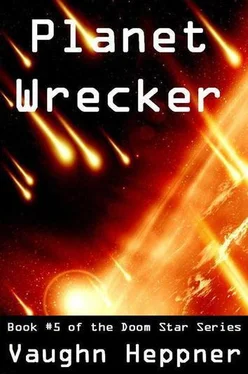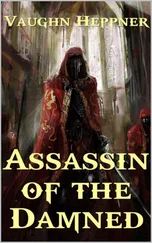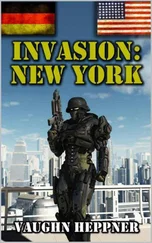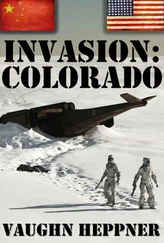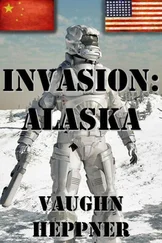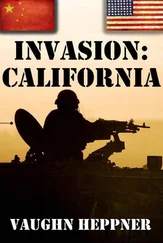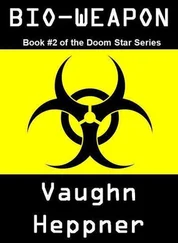“Sniper,” said Mune. The gyroc clicked. A shell popped out as its thruster-packet almost immediately ignited. With a whoosh, it sped up at a fourth-story window. There was a shattering of glass, an explosion and seconds later the sound of masonry as bits showered on the paving below.
One of the scarecrow-thin men shouted. The rest panted eerily as they came on faster. Some produced knives. Others brandished clubs. More than twenty men came at them now. They came from three different directions. Their clothes were tatters at best. The look in the men’s eyes—they were full of desperation.
“Halt!” Hawthorne shouted, raising his hands as if he could push them back.
Mune manually ejected the shells in his gyroc. He inserted others with red tips. “Fragmentation rounds, sir,” the captain explained.
“I didn’t realize it had gotten this bad,” Hawthorne whispered. There was a gun in his hand. He didn’t remember drawing it. “It’s murder just shooting them down.”
“Murdering them is better than dying, sir.”
“I order you to halt!” Hawthorne shouted.
One man did. Two others shouted at the man. That one jumped as if poked with fire, and he sprinted after the others.
Mune fired. A shell sped at the ten-man clump. Hawthorne witnessed the red burn of the rocket-shell’s exhaust. Then a proximity fuse must have sensed the targets. The shell exploded. Shrapnel tore into half of them, knocking down several, making too many scream and shriek.
Those still standing turned and sprinted for safety. Some of the fallen jumped up and ran after the others. The screams of the wounded continued.
Mune snarled a curse, and he aimed at a distant barrack. Two shells popped out of the gyroc. Then he leaped before Hawthorne, and Mune staggered as something thudded against him.
“You’re hit,” said Hawthorne.
“Yes, sir,” Mune said, wheezing heavily. “Now run while I shield you.” Without waiting for confirmation, the captain shoved Hawthorne, propelling him toward the lift. Another slug tore into his back, and the captain’s left arm abruptly sagged. Mune whirled around, lifted his gyroc and fired one second after another rifle cracked. A bullet chipped pavement near Hawthorne’s foot.
The Supreme Commander’s belly curled with fear. Snipers are trying to kill me . He ran. Something whined past his ear. A spark against a metal post and another ricochet—Hawthorne roared with frustration.
“Go that way, sir.”
Hawthorne heard the voice, and he felt pressure move him rightward. He ran toward the human welfare buildings. Beyond them was one of three operable lifts to this level. Political Harmony Corps had blocked the stairwells two weeks ago, while the other elevators had been dynamited by lift security.
The reports he’d read said the food riots down here had been suppressed. Emergency supplies and riot control squads were supposed to have dampened things. He’d wanted to see a lower level himself, assess things with his own eyes and ears. This had been a surprise inspection. The snipers, they implied that someone in the higher government echelons had smuggled rifles down here.
Have the security people been compromised?
Mune groaned. Hawthorne glanced at him. Pain creased the captain’s heavy features. Blood welled from holes in his tunic. One arm hung limply. The other held the gyroc.
“Hang on,” Hawthorne wheezed. “We’re almost to the lift.”
The muscles on the captain’s face bunched tight. He gave an imperceptible nod.
They rounded the last corner of the welfare buildings, with the wide veranda before them and then the lift.
Hawthorne uttered a single-word curse. The lift was shut and the security people were gone. In twenty seconds, he passed the temporary barriers, ran a little farther and slapped his hand against the call button.
“Sir,” Mune said.
Hawthorne turned as the captain’s heavy body crumpled onto the flooring. Blood welled from Mune’s back where he’d taken several sniper slugs.
At that moment, the elevator door opened, and half-a-dozen bionic men tumbled out. They wore combat armor and cradled machineguns.
“Sir,” said their leader.
“Where did you—?” Hawthorne tried to ask.
“Captain Mune sent us a signal, sir,” said the leader.
One of the bionic bodyguards knelt beside Mune. He pulled out a medkit and pressed it against the captain’s neck.
“Where are the lift people?” asked Hawthorne.
“In custody, sir,” said the leader.
Hawthorne nodded. It was time to leave.
Two days later, James Hawthorne paced before his desk in his office on the Third Level of New Baghdad. The city had sixty levels all told, one of the deepest in the Eurasian landmass. New Baghdad contained more than fifty-seven million inhabitants, the majority of them government workers.
Old-style books lined the shelves beside him. The shelves were filled with military history texts. Hawthorne clasped his hands behind his back as he paced. He’d worn a path in his carpet. More than once, he’d debated putting in wood flooring but had never gotten around to giving the order.
The more he thought about the episode in the Fifty-third Level, the more it troubled him.
Hawthorne stopped and scowled at his military history books. Reading was his greatest comfort. History and military history in particular had always been his passion. Earth was like the Chin Empire that had once faced Genghis Khan and his Mongols. Genghis Khan had fielded a single host of nomadic horse-archers. The Chin had possessed hundreds of thousands of solid soldiers, as well as owning the Great Wall of China and countless cities of teeming millions with vast protective walls. As important, the nomads had lacked siege equipment to breach those walls.
Yet Genghis Khan’s nomads were warrior’s born and bred. The windswept steppes and vicious tribal warfare had hardened the nomads into the most brutally efficient warriors of the medieval world. Genghis Khan had been arguably the greatest warlord of history. The combination had proven too much for the Chin, for the Sung, the Turks, Arabs, Russians, Poles and Hungarians. The Mongols had swept the medieval world in a relentless tide of conquest. Their march hadn’t been merely measured in miles, but in degrees of latitude and longitude across the globe.
The Highborn were the Mongols of today. Few in number compared to Earth’s masses, they outfought and outgeneraled Social Unity’s armies.
A ping sounded at the door. Hawthorne turned in surprise. He’d left orders that no one disturb him. Because of what had occurred two days ago, he now became queasy. Had someone corrupted his bodyguards? Three strides brought him behind his desk. He opened a drawer and placed a hand on his gun, the same gun he’d used down in Level Fifty-Three.
“Enter,” he said.
The door opened and Captain Mune’s wheelchair rolled in.
“What are you doing up?” Hawthorne asked.
“Reporting for duty, sir,” Mune said. He had a bandage on his cheek and a crease on his forehead that quickheal hadn’t been able to erase yet.
Hawthorne released his gun and closed the drawer. “You should still be in the hospital.”
It was a heavily-built wheelchair, made to take Mune’s weight. His chest looked bulkier than normal, making the fabric of his uniform strain against his buttons. Bandages likely caused that. His gyroc was slung in a holster, dangling from his right armrest.
“The bullets caused a lot of bleeding, but little internal damage, sir.”
“I’ve read the report, Captain. You’re belittling your injuries.”
“I’m supposed to keep off my feet. I can do that sitting here, sir. In case of another emergency, I’m quite capable of standing and doing what’s necessary.”
Читать дальше
